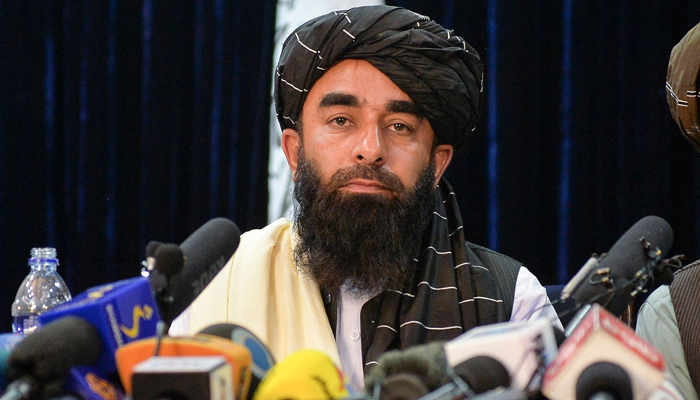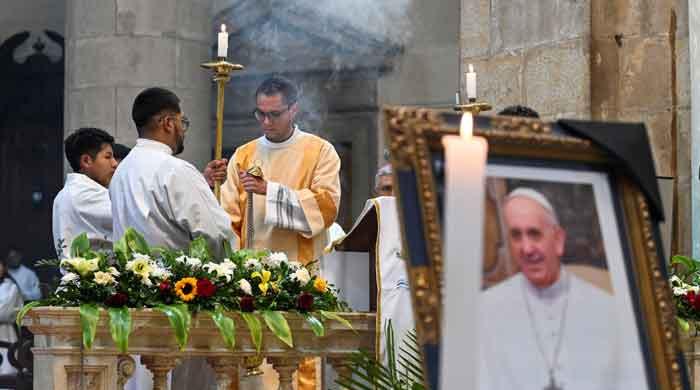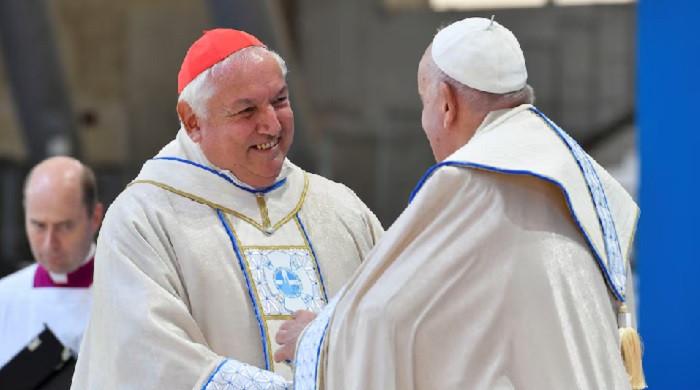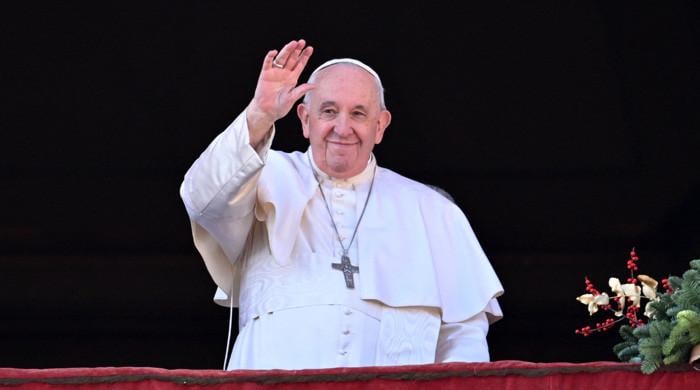Taliban support women's rights, free media under Islamic law: spokesman
"We want to do away with the factors for conflict. Therefore, the Islamic Emirate does not have any animosity towards anybody," says Zabiullah Mujahid
August 17, 2021

- Zabihullah Mujahid promises Taliban will respect the rights of women, seek good relations with other countries and not extract retribution on former members of the Afghan military and police.
- Spokesman also says media will be free and independent to "critique" the Taliban, but must operate under Islamic rules.
- Pledges a narcotics-free Afghanistan.
Taliban spokesman Zabihullah Mujahid on Tuesday said the group does not harbour any kind of hostility with anyone, will support women's rights and a free media under Islamic law, in his first press conference since the insurgent group took over Kabul.
"We want to do away with the factors for conflict. Therefore, the Islamic Emirate does not have any kind of hostility or animosity towards anybody," he said, with an interpreter translating his speech in English. He added that all animosity "has come to an end".
"We would like to live peacefully. We do not want any internal enemies or external enemies," he said.
The Taliban would not seek retribution against former soldiers and members of the Western-backed government, the spokesman said, saying the movement was granting an amnesty for former Afghan government soldiers as well as contractors and translators who worked for international forces.
"War has ended [...] (the leader) has pardoned everyone," he said.
Mujahid noted that Afghanistan is at a historic stage where the country's men and women are looking to the Taliban with regard to their future.
"I would like to assure [them] that after consultations that will be completed very soon, we will be witnessing the formation of a strong, Islamic, and inclusive government, InshaAllah."
'Taliban entered Kabul after incompetent govt failed to ensure security'
The spokesman claimed that when the Taliban forces entered the Afghan capital, Kabul, "there were no casualties", terming it a "great development".
He said there were some rioters wanting to "abuse the situation".
"We realised that that problem was going on [...] but we would like to assure the residents of Kabul of their full security, of protection of their dignity and security and safety. Security has been ensured. God-willing, day by day there will be more security," he said.
Mujahid said that the security of embassies is of "crucial importance" to the Taliban and wants to assure other countries of that those areas will have "complete security".
"Your representatives, your embassies, your missions, international organisations, aid agencies, we assure you we will not allow anybody to do anything against you. Your security is ensured. Our forces are there round-the-clock to ensure your security," he said.
He said that the Taliban "do not wish to see any kind of chaos" in Kabul.
"Our plan was to stop at the gates of Kabul after capturing all other provinces," the spokesman claimed, adding that a "smooth transition" of power was what the group had sought to avoid "trouble, harm and damages".
Mujahid, in criticism of the previous government, said that it was so "incompetent" that their security forces "could not do anything to ensure security", forcing the Taliban to step in and "take responsibility".
"The abusers and rioters wanted to abuse the name of the Islamic Emirate to enter houses and harass people and steal, therefore we instructed our forces to enter Kabul [...] and ensure security," he said.
He reiterated that all residents of Kabul should "rest assured" their security is "guaranteed".
Mujahid also sought to assure the international community and the regional countries that the Taliban "will not allow the use of Afghan territory against anybody".
"We are committed to this pledge. You will not be harmed anywhere from our soil," he said.
'Right of Afghans to act in accordance with own religion, culture'
The Taliban spokesman said that the group wishes to request the international community to be treated in accordance with international norms accorded to all countries.
"We do not wish to have any problem with the international community. We only wish to act on the basis of the principles of our religion, our culture.
"We have given a lot of sacrifices. We have the right to act on the basis of our religious principles and rules and regulations. This is the right of the Afghans," he said, noting that all countries have their own rules and policies.
"No one should be worried about our norms and principles."
'Women to work with us shoulder-to-shoulder'
Speaking on women's rights, he said it was a "very important issue".
"The Islamic Emirate is committed to the rights of women within the framework of the Sharia. Our sisters, our women will have the same rights, and will be able to benefit from them.
"They can have activities in different sectors and areas on the basis of our rules and regulations — in education, health and other areas," he said, adding that they will "work with us shoulder-to-shoulder".
Mujahid said that over any concerns regarding women that the international community have, the Taliban would like to "assure them that there will be no discrimination against women".
He reminded the world, however, that "our women are Muslim and will also be happy to be living within the framework of Sharia (law)".
Earlier in the day, Suhail Shaheen, spokesman for the group's political office in Doha, told Britain's Sky News that the full burqa will not be made compulsory for women.
"The burqa is not the only hijab (headscarf) that (can) be observed, there is different types of hijab not limited to burqa," Shaheen said.
The burqa is a one-piece overgarment that covers the entire head and body, with a mesh panel to see through.
Shaheen did not specify other types of hijab that would be deemed acceptable by the Taliban.
He did, however, say that women "can get education from primary to higher education — that means university".
Economy
The Taliban spokesman's briefing also touched on the issue of the economy, for which he said that "as soon as the conflict is done away with", an infrastructure for the economy will be developed.
He spoke of the use of natural resources that Afghanistan has, to "revitalise the economy", for the country's reconstruction and for prosperity.
"Therefore the Islamic Emirate is requesting the whole international community [...] we can very soon, very quickly can change the situation economically. Every Afghan wants to improve his or her life.
"The whole community will be active in trade, in economics," he said, adding that the Taliban are "committed to build our society".
He also termed the group as the "servants of the nation".
Mujahid further pledged that Afghanistan, the source of most of the world's heroin according to a United Nations drugs control agency, would be free of narcotics, asking the international community to help it develop alternative crops for farmers who have relied on opium poppies for their livelihood.
Media
Mujahid said private media could continue to be free and independent in Afghanistan, adding the Taliban was committed to the media within its cultural framework.
"Islam is a very important value in our country. Nothing should be against Islamic values when it comes to the activities of the media," he said.
"They can critique our work so we can improve," the spokesman added.











